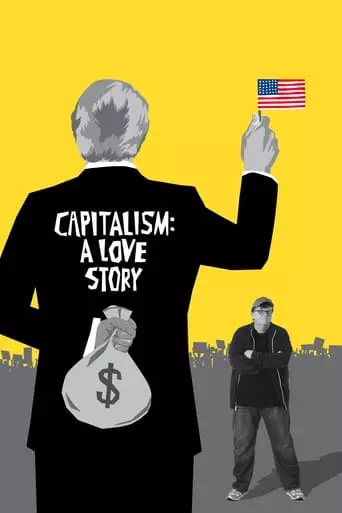Michael Moore comes home to the issue he’s been examining throughout his career: the disastrous impact of corporate dominance on the everyday lives of Americans (and by default, the rest of the world).
Capitalism: A Love Story is a 2009 documentary directed by Michael Moore, known for his critical examinations of American society and politics. In this film, Moore delves into the systemic issues of capitalism in the United States, exploring how corporate interests have influenced government policies and the daily lives of ordinary citizens.
The documentary begins with Moore reflecting on the prosperity of the 1950s, highlighting the high tax rates on the wealthy, strong labor unions, and the availability of free education and healthcare. He contrasts this with the contemporary landscape, where corporate greed has led to economic disparities, job outsourcing, and the erosion of workers’ rights. Through interviews, archival footage, and investigative reporting, Moore exposes the detrimental effects of unregulated capitalism, including the 2008 financial crisis, corporate bailouts, and the exploitation of workers.
The film also examines the concept of corporate personhood, where corporations are granted legal rights similar to individuals, allowing them to exert significant influence over political processes. Moore critiques the notion that capitalism inherently leads to prosperity for all, arguing that it often results in the concentration of wealth and power in the hands of a few, to the detriment of the many.
Main Themes
- Economic Inequality and Corporate Greed
Moore explores how capitalism has led to significant economic disparities, with the rich accumulating wealth at the expense of the working class. He highlights instances where corporations prioritize profits over the well-being of employees and communities, leading to job losses, wage stagnation, and increased poverty.
- Government Corruption and Corporate Influence
The film examines the symbiotic relationship between corporations and the government, where policies are often crafted to benefit corporate interests rather than the public good. Moore discusses how lobbying, campaign contributions, and the revolving door between corporate and government positions undermine democratic processes and lead to policies that favor the wealthy.
- Labor Rights and Worker Exploitation
Moore delves into the decline of labor unions and the erosion of workers’ rights, illustrating how capitalism has led to the exploitation of workers through practices such as outsourcing, wage suppression, and the weakening of labor protections. He emphasizes the importance of workers’ rights in achieving a fair and just society.
- Moral and Ethical Implications of Capitalism
The documentary raises questions about the morality of a system that prioritizes profit over human well-being. Moore critiques the ethical implications of corporate actions that harm individuals and communities, challenging the viewer to consider the true cost of capitalism.
Impact of the Movie
Capitalism: A Love Story received mixed reviews from critics. On Rotten Tomatoes, the film holds a 76% approval rating based on 157 reviews, with an average rating of 6.8/10. The consensus reads, Michael Moore’s latest documentary is a scathing critique of corporate America and the political system that enables it. On Metacritic, the film has a score of 66 out of 100, indicating generally favorable reviews. Critics praised Moore’s passionate and engaging approach to the subject matter, though some criticized the film for lacking depth in its analysis. The documentary sparked discussions about economic inequality, corporate influence in politics, and the ethical implications of capitalism, contributing to ongoing debates about economic systems and social justice.
7 Reasons to Watch Capitalism: A Love Story
- In-Depth Analysis of Economic Systems
The film provides a comprehensive examination of capitalism, offering insights into its history, evolution, and impact on society. Moore’s investigative approach sheds light on the complexities of economic systems and their effects on individuals and communities.
- Engaging Storytelling and Cinematic Techniques
Moore employs a mix of humor, satire, and poignant storytelling to convey his message, making complex economic concepts accessible and engaging. His unique filmmaking style keeps the audience interested while delivering critical information.
- Real-Life Case Studies and Interviews
The documentary features interviews with individuals affected by corporate policies, providing personal stories that humanize the broader economic issues discussed. These narratives offer a compelling look at the real-world consequences of corporate actions.
- Critical Examination of Corporate Practices
Moore critically examines corporate practices, exposing unethical behaviors and highlighting the negative impact of corporate greed on society. This analysis encourages viewers to question and critically assess the role of corporations in modern life.
- Exploration of Government-Corporate Relationships
The film delves into the relationship between government and corporations, illustrating how corporate interests can influence policy decisions. This exploration provides insight into the mechanisms of power and influence in political systems.
- Call to Action for Social Change
Moore concludes with a call to action, urging viewers to engage in social and political activism to address the issues raised in the film. This motivational aspect inspires viewers to become more involved in efforts to create a more equitable society.
- Thought-Provoking Content
The documentary challenges viewers to critically examine the capitalist system and its implications, fostering a deeper understanding of economic and social issues. It encourages reflection on personal beliefs and societal values.
How Will You Feel After Watching Capitalism: A Love Story (2009) ?
After watching Capitalism: A Love Story, you may experience a range of emotions, including anger, frustration, and a sense of empowerment. The film’s candid portrayal of economic inequalities and corporate malfeasance may evoke feelings of indignation and a desire for change. You might feel motivated to learn more about economic systems and consider how they affect your life and the lives of others. The documentary’s call to action may inspire you to become more engaged in social and political issues, advocating for policies that promote fairness and justice. Overall, the film aims to provoke thought and discussion, leaving you with a deeper understanding of the complexities of capitalism and its impact on society.

